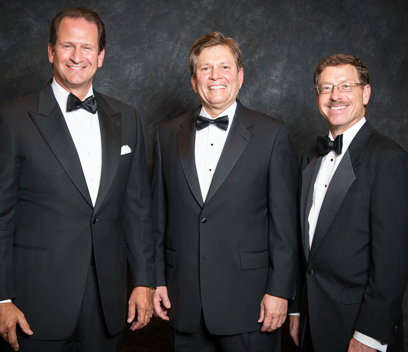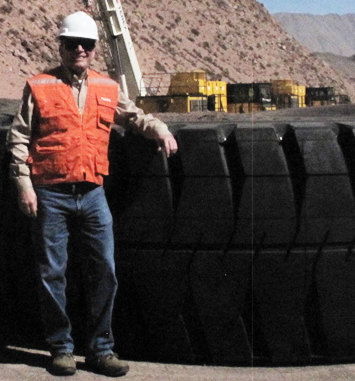© 2014 The Texas Lawbook.
By Mark Curriden – (October 13) – On Christmas Eve 1958, most children opened presents, sang carols or dreamed about what the next morning would bring.
But not Carlos Hernandez. He remembers that night 56 years ago vividly. Fighter planes firing bullets and missiles roared over his house in Cuba.
“The family gathered in one spot in the house where we thought it would be safe for shelter,” he says. “It was very scary. Everyone was afraid.”
Weeks later, there was more fear and trepidation as eight-year-old Carlos and his parents fled Cuba, leaving behind all their belongings, for Miami.
“We were political exiles,” he says. “We were in a new country, dealing with new people who spoke a different language. We had every intention of going back. We never thought Castro would survive.”
Five decades later, Hernandez is the chief legal officer at Irving-based Fluor Corporation, a $27 billion engineering construction company based in Irving. He leads a team of nearly 50 lawyers in-house and oversees the hiring of scores of lawyers to handle various regulatory, litigation and transactional matters for the company.

Last week, the General Counsel Forum honored Hernandez with its prestigious Robert H. Dedman Award for Ethics and Law.
A civil engineer-turned-construction lawyer, Hernandez is widely recognized throughout the business and legal communities as a national leader in corporate compliance. He is a zealous advocate of diversity in law firms. He insists that his companies operate with strong moral conduct, even in times of severe crisis. And he requires the lawyers he employs to treat even the most vehement opponents in disputes with respect and professionalism.
“Carlos is the epitome of ethics and professionalism,” says Baker Botts partner Tim Durst, one of two lawyers who nominated Hernandez for the award. “His character has been repeatedly tested by fire throughout his life and career and yet he remains committed to doing what is right.”
David Seaton, the chairman and CEO of Fluor, says Hernandez’s commitment to doing what is right is embedded in his genes.
“Carlos truly lives the principle of ethics,” he says.

Baker & McKenzie partner Brian Hurst says that Hernandez is not only an excellent lawyer, he’s also a very nice guy.
“He fits the requirements of the ethics award to a tee,” he says. “In addition, he is an example of living the American dream.”
As a young boy new to the United States, Hernandez aspired to be a major league baseball player. His fellow high school seniors voted him “most likely to succeed,” according to his 1972 Yearbook.
As he grew older, he developed a second passion: construction.
“I loved the idea of building bridges and highways and other structures,” he says.
Hernandez studied civil engineering at Purdue University in Indiana and then followed some friends to law school at the University of Miami.
“Studying law was not comfortable to me at all,” he says. “I loved the exactness of math and science.”
Because of his knowledge of engineering, Hernandez started his career as a litigator focusing on construction disputes. Two years later, he took his first in-house corporate legal job.
Hernandez spent 19 years in the corporate legal department at Armco Inc., an Ohio-based steel company. He was the general counsel in 2001 when the Enron scandal hit and Congress passed the Sarbanes-Oxley corporate compliance law.

“It changed everything for general counsel,” he says. “Corporate legal departments before Enron used to be run more like law firms responding to the legal needs of the companies. We now integrate the legal department with the business side and general counsel are more involved in nearly every aspect of a company’s operations.”
Hernandez says that while corporate in-house lawyers should be more business-minded, they also need to have “a degree of separation and independence” from the business side.
“We need to be the legal and moral conscience of the company,” he says. “We obviously advocate for the company, but internally, if in-house lawyers find ourselves in conflict with our ethical duties, we should speak up.”
Part of doing the right thing, Hernandez says, is working diligently to improve diversity in the legal profession.
“I strongly encourage the law firms who work with us to be diverse – it is part of our standard engagement agreement,” he says. “It is highly disappointing that diversity continues to be a problem at so many law firms.”
Lawyers and business leaders say that Hernandez solidified his reputation as a strong ethical leader a decade ago when he handled the sudden and shocking 2003 demise of Fleming Companies, a $16 billion wholesale grocery distributor based in Lewisville.
When Hernandez took over as general counsel of Fleming, the business and its top executives faced multiple investigations by the U.S. Securities and Exchange Commission for securities fraud and overstating earnings. The company’s shareholders had filed multiple class action lawsuits alleging misconduct. The company’s largest client, Kmart, declared bankruptcy. A year later, Fleming was gone, too.

“My experience at Fleming was tough and painful, but it was very instructive,” Hernandez says. “It was baptism under fire. It was a company with a lot of issues.”
Lawyers who worked on various aspects of the Fleming debacle say that Hernandez was the one stabilizing factor and that even the attorneys at the SEC and those suing the company realized that he could be trusted.
“Carlos was under great scrutiny from his own board of directors, the SEC and plaintiffs’ lawyers and he came through it because every action he took was ethical, thoughtful and professional,” Durst says.
Craig Birchette, an assistant general counsel over litigation and arbitration at Fluor, says Hernandez is an extraordinary lawyer and leader because he refuses to bend his ethics during tough times.
“Carlos put a previous job as general counsel on the line in situations where he had to tell senior executives that their conduct was improper and that the CEO had to leave,” says Birchette, who has worked for Hernandez at three separate companies.
“I’ve seen Carlos facing situations where the conduct wasn’t specifically illegal but was in a gray area,” he says. “The easy thing for Carlos to have done was to simply tell the executives that the conduct was technically illegal. But that is not Carlos. He let them know that the conduct was improper and unethical.”
“He’s very level-headed during times of crisis and he instills calmness into every situation,” says Birchette. “When you describe most general counsel, ‘understated’ and ‘low-key’ are not words usually used to describe them.
“But Carlos is exactly that – he is so humble and gracious,” he says. “The people who work for him will take a bullet for him. He inspires loyalty.”
Hernandez’s next job was general counsel of a large steel company, which he thought would provide a slower pace or at least a reprieve from the intense work the Fleming job demanded.
He was wrong.
“At my first board meeting as general counsel, the owner walked in and said he had just received an offer to buy the company,” he says.
Since 2007, Hernandez has been the top lawyer at Fluor, a company that enjoys a global reputation as a leader in business ethics and corporate compliance.
Hernandez, in a two-hour interview in his Irving office on the campus of Fluor, says the difficulty of his previous jobs makes him appreciate his current position.
“I think I now deserve a good, stable place to work,” he says. “My life here has been easy because this is a company that takes care of its people and understands that its most important assets are its people.”
© 2014 The Texas Lawbook. Content of The Texas Lawbook is controlled and protected by specific licensing agreements with our subscribers and under federal copyright laws. Any distribution of this content without the consent of The Texas Lawbook is prohibited.
If you see any inaccuracy in any article in The Texas Lawbook, please contact us. Our goal is content that is 100% true and accurate. Thank you.
